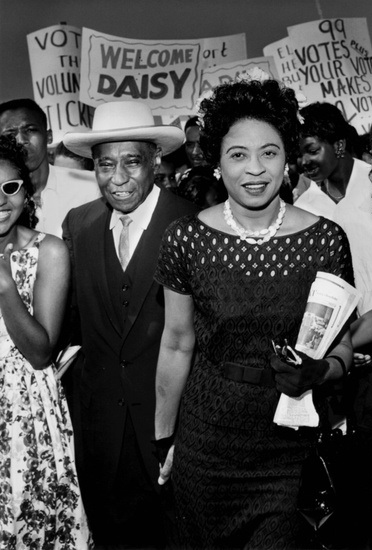Sharon La Cruise ’84 combined her interests in history, journalism and filmmaking to create a compelling documentary about a forgotten civil rights activist.
by Ela Schwartz
Historians dream about contributing to our knowledge about the past, bringing to light a person or event that was in the shadows. For Sharon La Cruise ’84, this person was Daisy Bates.

Photo © The Commercial Appeal
As a history major with a particular interest in African American studies, Ms. La Cruise was well aware of the civil rights movement. But she had never heard of Daisy Bates until reading her profile in a book called I Dream a World, where she learned about this activist who had fought for the integration of Central High School in Little Rock, Arkansas, in 1957. Ms. La Cruise says she found herself wondering why she’d never come across any mention of Daisy Bates in her history books. So she set out to discover the reason.
Her quest to tell Ms. Bates’ story resulted in a seven-year journey culminating in an eye-opening documentary, Daisy Bates: First Lady of Little Rock. The film gives this little-known, but pivotal, figure a well-earned place in history.
The film tells the story of Daisy Bates, from learning as a child that her mother had been raped and murdered by white men who were never held accountable, to her rise as head of the Arkansas NAACP, to protector of the courageous students known as the Little Rock Nine. A charismatic force to be reckoned with, Ms. Bates was despised by segregationists and beloved by the media. She even addressed some 250,000 people at the historic March on Washington in 1963, where Martin Luther King Jr. gave his immortal “I Have a Dream” speech.
But after the world turned its attention away from Little Rock, Ms. Bates eventually became reduced to a minor historical footnote.
Ms. La Cruise points to several reasons why Ms. Bates’ fame was fleeting. Many female activists decided to focus on racial, not gender inequality , she explains. A series of strokes robbed Daisy Bates of her eloquence. And she was a controversial figure who was involved with a married man and loved to smoke, play poker and be in the limelight.
“I went looking for Rosa Parks,” Ms. La Cruise explains. “I found this woman who was much more complicated. The Little Rock Nine have conflicting feelings about her. They felt she got too much credit and tended to dominate the entire crisis. I didn’t know if I wanted to spend time with Daisy Bates. Then I realized that her imperfections are what make her so fascinating. And when she was called, she did the right thing.”
Ms. La Cruise has had her own journey. Born in Kingston, Jamaica, she grew up in Bushwick , then came to Adelphi, which at the time was overwhelmingly white. But she found the school a welcoming place where she gained valuable skills as a history major. “At Adelphi, I did hardcore research, which is a critical skill for a filmmaker,” she says, as demonstrated in scenes in Daisy Bates when Ms. La Cruise pores through copious amounts of archival footage to find information about her subject.
After obtaining a bachelor’s degree, she decided to pursue another passion and earned a master’s from New York University’s graduate program in journalism. She moved to Atlanta, then Boston, where, as an associate producer, “I met everyone in the documentary field in the Northeast,” she says, “and learned the craft from some of the best filmmakers of their generation.”
These connections served her well when it came time to write, direct and produce her own film by accompanying her on shoots and lending advice and support. Even so, she notes that producing a documentary means “the weight is on you. It’s your baby.”
Although taking on another project of the scope of Daisy Bates is a possibility, for now Ms. La Cruise is focusing on her work as an associate at the Ford Foundation, where she helped form Just Films, a unit which targets $10 million a year toward funding films that primarily concern social justice.
For further information, please contact:
Todd Wilson
Strategic Communications Director
p – 516.237.8634
e – twilson@adelphi.edu